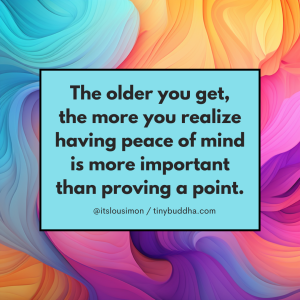
“It’s really important to be able to receive love and receive compassion. It is as important as being able to give it.” ~Pema Chodron
Yesterday morning two of the correspondents on the news in Boston (where I’m home for the holidays) had an interesting conversation about the classic It’s a Wonderful Life.
One of them said he’s not a big fan of the movie, which instilled a sense of complete outrage in me.
How dare he take George Bailey’s name in vain! It’s such an inspirational film! From saving Harry’s life to finding Zuzu’s petals, every scene gets my little heart aflutter with renewed hope in our ability to make a difference and find happiness.
When the initial offense faded, I listened to what clearly-heartless news guy was saying—and he actually had a point.
The main character, George Bailey, sacrificed everything he wanted in life for the people around him. If he continued to operate in a constant state of self-sacrifice, he’d likely always have regrets where other men have dreams.
And why should he not have the chance, at some point, to feel satisfaction that isn’t hinged upon having saved someone else’s life?
At the end of the movie he receives the ultimate assurance that his life is best lived with everyone else’s interests before his own: a party where he receives all the gratitude and admiration he clearly felt had been lacking prior.
The implication seems to be that he should continue on this path because everyone’s life would have fallen apart if he didn’t come to their rescue.
The movie critique got me thinking about the sacrifices we make for other people. If you know me, you may find it off that I, ever the eternal optimist, have chosen to dissect the act of selflessness right before a holiday that often inspires it.
This is precisely why I have.
Holidays generally bring out the best in people. When we pull out the tear jerkers that remind us people care and miracles happen, we’re motivated to be the change we want to see in the world. To express and show our feelings. To care in action.
But what’s more important than an epiphany shouted from a balcony on Christmas morning is an understanding of healthy giving—both to others and ourselves—that’s sustainable all year long.
I, for one, would find this information invaluable, as I’m somewhat of a George Bailey, ever willing to consider someone else’s feelings and interests before my own.
On some level it’s because I want to be kind, but often I’m motivated by the desire to feel important and useful. Or to please other people. Or even to avoid facing my own needs.
If you can relate on any level, consider these reasons to find a balance between doing for others and yourself:
Too much sacrifice can harm relationships.
According to Ted Hagen, PhD, “The give and take between two people creates mutual respect. It strengthens a relationship.”
Excessive giving can create internal resentment.
If you continually put everyone else first, you may eventually resent everyone for expecting so much of you, when in all reality, you had the choice to give less at any time.
Sacrificing is not always helpful.
We often give because we think it’s the right thing to do, but sometimes it’s just plain not. People (children especially) need to learn to take care of themselves and to accept the world won’t always meet their every wish, whim, and need.
To truly give yourself, you need to take care of yourself.
Your daily car ride may make someone’s life easier, but your bond as a healthy, happy person is far more valuable. You can only offer that if you take care of your own needs, as well.

We all deserve a life that involves doing and resisting, and giving and taking, and being selfish and selfless at times. I recommend the following steps to find a balance with all of the above:
1. Identify your current give/take ratio.
If you’d like to find a balance you have to know how off-balance you currently are. Is it fifty-fifty? Or seventy-thirty?
2. Establish your reason for imbalance.
Are you overextending yourself to feel powerful? Or to please everyone? You need to figure this out to address the next part.
3. Find an alternative plan.
If your goal is to feel powerful and helpful, start mentoring a child on the weekend. If you’d like to be well-liked, nurture qualities and skills that attract people to you—other than your tendency to say yes. This is a far better approach to gaining respect anyway.
4. Take a piece of the pie.
You can’t give everyone in your life 100%, so you likely give your parents, friends, and significant other a percentage of your energy. Consider a piece of that your own, and honor that in your choices.
5. Think of taking as another form of giving.
Everything you get from giving, the people who love you will get the same if you give them a chance to reciprocate. Why not allow them the opportunity to feel helpful and important, too?
6. Take a drama-free look at your relationships.
Do some people take more than give? The goal isn’t to blame, attack, or make yourself a victim, but rather to establish which relationships need to change.
7. Make attempts to repair unbalanced relationships.
If the give/take ratio is off-kilter, you need to address this, either by asking for what you need when you need it or initiating a constructive conversation. If the bond is worth saving, the other person will be at least a little receptive.
8. Make a habit of expressing your needs.
People won’t always anticipate them and step up to the plate, even if you operate that way. If you state your expectations, it will be easier for people to meet them. (Trust that they’ll want to! That’s how healthy relationships work.)
9. Check in without an even-Steven philosophy.
You don’t need to keep an internal scorecard of how much people are doing for you, but you should feel that, on the whole, they’re there for you physically and emotionally as much as you’re there for them.
10. Ask yourself, “Would I need a George Bailey moment of gratitude and admiration to justify all I’ve sacrificed?”
If the answer is yes, you know you’re not living a completely fulfilling life—one in which you look out for yourself, and honor your wants and needs as much as other people’s.
This makes now the perfect time to ask yourself: How can I accept where the choices I’ve made have taken me, but make more balanced choices from here on out for a truly wonderful life?
Photo by mrlerone.
About Lori Deschene
Lori Deschene is the founder of Tiny Buddha. She’s also the author of Tiny Buddha’s Gratitude Journal, Tiny Buddha's Worry Journal, and Tiny Buddha's Inner Strength Journal and co-founder of Recreate Your Life Story, an online course that helps you let go of the past and live a life you love. For daily wisdom, join the Tiny Buddha list here. You can also follow Tiny Buddha on Facebook, Twitter, and Instagram.
- Web |
- More Posts













 Though I run this site, it is not mine. It's ours. It's not about me. It's about us. Your stories and your wisdom are just as meaningful as mine.
Though I run this site, it is not mine. It's ours. It's not about me. It's about us. Your stories and your wisdom are just as meaningful as mine. 